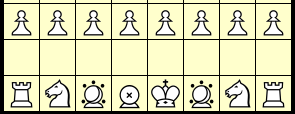[ List Earliest Comments Only For Pages | Games | Rated Pages | Rated Games | Subjects of Discussion ]
Comments/Ratings for a Single Item
On step 2, at the site http://www.chessvariants.com, there is no link to 'Games Played With Regular Pieces'.
The term used on the Main Menu is 'Chess variants with usual equipment', directly beneath 'Other boards with an unusual shape'. Aesthetically a second G in the name would be nice, to match the other double letters. Just one question: what happens if the new rules put the player who just played in check?
If neither double 5 nor double 6 before White's first move, what spot on the list does play start at?
Ack, sorry I didn't cover it. I wrote this variant years ago. Start out on 'Regular Chess.' A variant of the variant, of course, would be to roll the dice to decide where to start. And, of course, the 5-5 or 6-6 version listed here gives a 1/18 chance of a shift every player-move; if that's too low or high, change it.
<p>If a player is immediately in check- umm, didn't think of that. This is ChessVariants.com- invent your own rules! I'd suggest that the player abruptly in check, if it's not his or her move, gets an extra turn, but with it being such a special case, it seems an awkward, fiddly, and overall stinky rule. Thoughts?
An elegant rule solving this problem: If the player is in check when it is not his turn due to a rule change, the effect of that rule change is delayed until it is his turn--the old rules will apply to his opponent's turn.
 Charles Gilman wrote on Wed, Jun 16, 2004 03:40 AM EDT:Good ★★★★
Charles Gilman wrote on Wed, Jun 16, 2004 03:40 AM EDT:Good ★★★★Having given some thought to this in connection with some future variants of my own using dice, I have thought of a possibly even more elegant solution: rolling the dice at the START of each move determines what the rules become at the END of it. This way players can move under the 'old' rules to avoid being in check under the 'new' ones, though not necessarily under the 'old'! The only question that then arises is differentiating checkmate from stalemate when no such move is available.
This is too funny. Sounds like a recipe for entertaining chaos. :)
I have a suggestion: If a rule change puts a player into check, the rule does not apply until the start of his turn.
We don't have a page called "Games Played With Regular Pieces". Could I modify this to something more useful?
 Bn Em wrote on Mon, Apr 14 09:38 AM EDT in reply to Fergus Duniho from Sun Apr 13 05:42 PM:
Bn Em wrote on Mon, Apr 14 09:38 AM EDT in reply to Fergus Duniho from Sun Apr 13 05:42 PM:Presumably ‘Playable with a Chess Set’ was meant, as in the submenu in the Games dropdown. Which of course isn't a link, but one can easily synthesise a matching database query.
Thanks, I modified your query to include only Game pages and added it to the page.
13 comments displayed
Permalink to the exact comments currently displayed.
